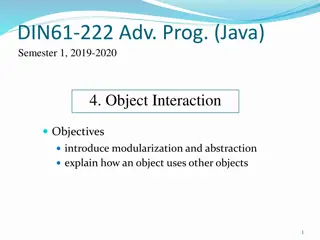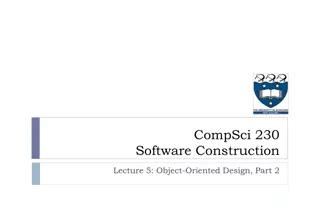Software Design & Implementation: Abstraction and Types
The concept of abstraction in software design and implementation, focusing on abstraction over computation, data, and types. Understand the benefits of abstraction and how it aids in maintaining code clarity and reusability across different contexts. Delve into related abstractions and the usage of generics for polymorphism. Discover the importance of parameter declaration and type variables in creating flexible and robust software systems.
Download Presentation

Please find below an Image/Link to download the presentation.
The content on the website is provided AS IS for your information and personal use only. It may not be sold, licensed, or shared on other websites without obtaining consent from the author.If you encounter any issues during the download, it is possible that the publisher has removed the file from their server.
You are allowed to download the files provided on this website for personal or commercial use, subject to the condition that they are used lawfully. All files are the property of their respective owners.
The content on the website is provided AS IS for your information and personal use only. It may not be sold, licensed, or shared on other websites without obtaining consent from the author.
E N D
Presentation Transcript
CSE 331 Software Design & Implementation Dan Grossman Fall 2014 Generics (Based on slides by Mike Ernst, David Notkin, Hal Perkins)
Varieties of abstraction Abstraction over computation: procedures (methods) int x1, y1, x2, y2; Math.sqrt(x1*x1 + y1*y1); Math.sqrt(x2*x2 + y2*y2); Abstraction over data: ADTs (classes, interfaces) Point p1, p2; Abstraction over types: polymorphism (generics) Point<Integer>, Point<Double> CSE331 Fall 2014 2
Why we love abstraction Hide details Avoid distraction Permit details to change later Give a meaningful name to a concept Permit reuse in new contexts Avoid duplication: error-prone, confusing Save reimplementation effort Helps to Don t Repeat Yourself CSE331 Fall 2014 3
Related abstractions interface ListOfNumbers { boolean add(Number elt); Number get(int index); } interface ListOfIntegers { boolean add(Integer elt); Integer get(int index); } and many, many more // abstracts over element type interface List<E> { boolean add(E n); E get(int index); } Lets us use types List<Integer> List<Number> List<String> List<List<String>> CSE331 Fall 2014 4
An analogous parameter Declares a new variable, called a formal parameter Instantiate with any expression of the right type E.g., lst.add(7) Type of add is Integer boolean interface ListOfIntegers { boolean add(Integer elt); Integer get(int index); } interface List<E> { boolean add(E n); E get(int index); } Declares a new type variable, called a type parameter Instantiate with any (reference) type E.g., List<String> Type of List is Type Type Never just use List (in Java for backward-compatiblity) CSE331 Fall 2014 5
Type variables are types Declaration class NewSet<T> implements Set<T> { // rep invariant: // non-null, contains no duplicates // List<T> theRep; T lastItemInserted; } Use Use CSE331 Fall 2014 6
Declaring and instantiating generics class Name<TypeVar1, , TypeVarN> { } interface Name<TypeVar1, , TypeVarN> { } Convention: One-letter name such as: TforType,Efor Element, K for Key,V for Value, To instantiate a generic class/interface, client supplies type arguments: Name<Type1, , TypeN> CSE331 Fall 2014 7
Restricting instantiations by clients boolean add1(Object elt); boolean add2(Number elt); add1(new Date()); // OK add2(new Date()); // compile-time error Upper bound interface List1<E extends Object> { } interface List2<E extends Number> { } List1<Date> // OK, Date is a subtype of Object List2<Date> // compile-time error, Date is not a // subtype of Number CSE331 Fall 2014 8
Revised definition class Name<TypeVar1 extends Type1, , TypeVarN extends TypeN> { } (same for interface definitions) (default upper bound is Object) To instantiate a generic class/interface, client supplies type arguments: Name<Type1, , TypeN> Compile-time error if type is not a subtype of the upper bound CSE331 Fall 2014 9
Using type variables Code can perform any operation permitted by the bound Because we know all instantiations will be subtypes! An enforced precondition on type instantiations class Foo1<E extends Object> { void m(E arg) { arg.asInt(); // compiler error, E might not // support asInt } } class Foo2<E extends Number> { void m(E arg) { arg.asInt(); // OK, since Number and its // subtypes support asInt } } CSE331 Fall 2014 10
More examples public class Graph<N> implements Iterable<N> { private final Map<N, Set<N>> node2neighbors; public Graph(Set<N> nodes, Set<Tuple<N,N>> edges){ } } public interface Path<N, P extends Path<N,P>> extends Iterable<N>, Comparable<Path<?, ?>> { public Iterator<N> iterator(); } Do NOT cut/paste this stuff into your project unless it is what you want And you understand it! CSE331 Fall 2014 11
More bounds <TypeVar extends SuperType> An upper bound; accepts given supertype or any of its subtypes <TypeVar extends ClassA & InterfaceB & InterfaceC & > Multiple upper bounds (superclass/interfaces) with & <TypeVar super SubType> A lower bound; accepts the given subtype or any of its supertypes Example: // tree set works for any comparable type public class TreeSet<T extends Comparable<T>> { } CSE331 Fall 2014 12
Where are we? Done: Basics of generic types for classes and interfaces Basics of bounding generics Now: Generic methods [not just using type parameters of class] Generics and subtyping Using bounds for more flexible subtyping Using wildcards for more convenient bounds Related digression: Java s array subtyping Java realities: type erasure Unchecked casts equals interactions Creating generic arrays CSE331 Fall 2014 13
Not all generics are for collections class Utils { static double sumList(List<Number> lst) { double result = 0.0; for (Number n : lst) { result += n.doubleValue(); } return result; } static Number choose(List<Number> lst) { int i = // random number < lst.size return lst.get(i); } } CSE331 Fall 2014 14
Weaknesses Would like to use sumList for any subtype of Number For example, Double or Integer But as we will see, List<Double> is not a subtype of List<Number> Would like to use choose for any element type I.e., any subclass of Object No need to restrict to subclasses of Number Want to tell clients more about return type than Object Utils is not generic, the methods should be generic CSE331 Fall 2014 15
Much better Have to declare type parameter(s) class Utils { static <T extends Number> double sumList(List<T> lst) { double result = 0.0; for (Number n : lst) { // T also works result += n.doubleValue(); } return result; } static <T> T choose(List<T> lst) { int i = // random number < lst.size return lst.get(i); } } Have to declare type parameter(s) CSE331 Fall 2014 16
Using generics in methods Instance methods can use type parameters of the class Instance methods and static methods can have their own type parameters Generic methods Callers to generic methods need not explicitly instantiate the methods type parameters Compiler just figures it out for you Type inference CSE331 Fall 2014 17
More examples <T extends Comparable<T>> T max(Collection<T> c) { } <T extends Comparable<T>> void sort(List<T> list) { // use list.get() and T s compareTo } (This one works but will make it even more useful later by adding more bounds) <T> void copyTo(List<T> dst, List<T> src) { for (T t : src) dst.add(t); } CSE331 Fall 2014 18
Where are we? Done: Basics of generic types for classes and interfaces Basics of bounding generics Now: Generic methods [not just using type parameters of class] Generics and subtyping Using bounds for more flexible subtyping Using wildcards for more convenient bounds Related digression: Java s array subtyping Java realities: type erasure Unchecked casts equals interactions Creating generic arrays CSE331 Fall 2014 19
Generics and subtyping List<Number> Number ? List<Integer> Integer Integer is a subtype of Number Is List<Integer> a subtype of List<Number>? Use subtyping rules (stronger, weaker) to find out CSE331 Fall 2014 20
List<Number> and List<Integer> interface List<T> { boolean add(T elt); T get(int index); } Number Integer So type List<Number> has: boolean add(Number elt); Number get(int index); So type List<Integer> has: boolean add(Integer elt); Integer get(int index); Java subtyping is invariant with respect to generics Not covariant and not contravariant Neither List<Number> nor List<Integer> subtype of other CSE331 Fall 2014 21
Hard to remember? If Type2 and Type3 are different, then Type1<Type2> is not a subtype of Type1<Type3> Previous example shows why: Observer method prevents one direction Mutator/producer method prevents the other direction If our types have only observers or only mutators, then one direction of subtyping would be sound But Java s type system does not notice this so such subtyping is never allowed in Java CSE331 Fall 2014 22
Read-only allows covariance interface List<T> { T get(int index); } Number Integer So type List<Number> has: Number get(int index); So type List<Integer> has: Integer get(int index); So covariant subtyping would be correct: List<Integer> a subtype of List<Number> But Java does not analyze interface definitions like this Conservatively disallows this subtyping CSE331 Fall 2014 23
Write-only allows contravariance interface List<T> { boolean add(T elt); } Number Integer So type List<Number> has: boolean add(Number elt); So type List<Integer> has: boolean add(Integer elt); So contravariant subtyping would be correct: List<Number> a subtype of List<Integer> But Java does not analyze interface definitions like this Conservatively disallows this subtyping CSE331 Fall 2014 24
About the parameters So we have seen List<Integer> and List<Number> are not subtype-related But there is subtyping as expected on the generic types themselves Example: If HeftyBag extends Bag, then HeftyBag<Integer> is a subtype of Bag<Integer> HeftyBag<Number> is a subtype of Bag<Number> HeftyBag<String> is a subtype of Bag<String> CSE331 Fall 2014 25
Where are we? Done: Basics of generic types for classes and interfaces Basics of bounding generics Now: Generic methods [not just using type parameters of class] Generics and subtyping Using bounds for more flexible subtyping Using wildcards for more convenient bounds Related digression: Java s array subtyping Java realities: type erasure Unchecked casts equals interactions Creating generic arrays CSE331 Fall 2014 26
More verbose first Now: How to use type bounds to write reusable code despite invariant subtyping Elegant technique using generic methods General guidelines for making code as reusable as possible Then: Java wildcards Essentially provide the same expressiveness Less verbose: No need to declare type parameters that would be used only once Better style because Java programmers recognize how wildcards are used for common idioms Easier to read (?) once you get used to it CSE331 Fall 2014 27
Best type for addAll interface Set<E> { // Adds all elements in c to this set // (that are not already present) void addAll(_______ c); } What is the best type for addAll s parameter? Allow as many clients as possible while allowing correct implementations CSE331 Fall 2014 28
Best type for addAll interface Set<E> { // Adds all elements in c to this set // (that are not already present) void addAll(_______ c); } void addAll(Set<E> c); Too restrictive: Does not let clients pass other collections, like List<E> Better: use a supertype interface with just what addAll needs This is not related to invariant subtyping [yet] CSE331 Fall 2014 29
Best type for addAll interface Set<E> { // Adds all elements in c to this set // (that are not already present) void addAll(_______ c); } void addAll(Collection<E> c); Too restrictive: Client cannot pass a List<Integer> to addAll for a Set<Number> Should be okay because addAll implementations only need to read from c, not put elements in it This is the invariant-subtyping limitation CSE331 Fall 2014 30
Best type for addAll interface Set<E> { // Adds all elements in c to this set // (that are not already present) void addAll(_______ c); } <T extends E> void addAll(Collection<T> c); The fix: A bounded generic type parameter Now client can pass a List<Integer> to addAll for a Set<Number> addAllimplementations won t know what element type T is, but will know it is a subtype of E So it cannot add anything to collection c refers to But this is enough to implement addAll 31 CSE331 Fall 2014
Revisit copy method Earlier we saw this: <T> void copyTo(List<T> dst, List<T> src) { for (T t : src) dst.add(t); } Now see this is more useful to clients: <T1, T2 extends T1> void copyTo(List<T1> dst, for (T2 t : src) dst.add(t); } List<T2> src) { CSE331 Fall 2014 32
Where are we? Done: Basics of generic types for classes and interfaces Basics of bounding generics Now: Generic methods [not just using type parameters of class] Generics and subtyping Using bounds for more flexible subtyping Using wildcards for more convenient bounds Related digression: Java s array subtyping Java realities: type erasure Unchecked casts equals interactions Creating generic arrays CSE331 Fall 2014 33
Wildcards Syntax: For a type-parameter instantiation (inside the < >), can write: ? extends Type, some unspecified subtype of Type ?, shorthand for ? extends Object ? super Type, some unspecified supertype of Type A wildcard is essentially an anonymous type variable Each ? stands for some possibly-different unknown type Use a wildcard when you would use a type variable exactly once, so no need to give it a name Avoids declaring generic type variables Communicates to readers of your code that the type s identity is not needed anywhere else CSE331 Fall 2014 34
Examples [Compare to earlier versions using explicit generic types] interface Set<E> { void addAll(Collection<? extends E> c); } More flexible than void addAll(Collection<E> c); More idiomatic (but equally powerful) to <T extends E> void addAll(Collection<T> c); CSE331 Fall 2014 35
More examples <T extends Comparable<T>> T max(Collection<T> c); No change because T used more than once <T> void copyTo(List<? super T> dst, List<? extends T> src); Why this works ? Lower bound of T for where callee puts values Upper bound of T for where callee gets values Callers get the subtyping they want Example: copy(numberList, integerList) Example: copy(stringList, stringList) CSE331 Fall 2014 36
PECS: Producer Extends, Consumer Super Where should you insert wildcards? Should you use extends or super or neither? Use ? extends T when you get values (from a producer) No problem if it s a subtype Use ? super T when you put values (into a consumer) No problem if it s a supertype Use neither (just T, not ?) if you both get and put <T> void copyTo(List<? super T> dst, List<? extends T> src); CSE331 Fall 2014 37
? versus Object ? indicates a particular but unknown type void printAll(List<?> lst) { } Difference between List<?> and List<Object>: Can instantiate ? with any type: Object, String, List<Object> is restrictive; wouldn't take a List<String> Difference between List<Foo> and List<? extends Foo> In latter, element type is one unknown subtype of Foo Example: List<? extends Animal> might store only Giraffes but not Zebras Former allows anything that is a subtype of Foo in the same list Example: List<Animal> could store Giraffes and Zebras CSE331 Fall 2014 38
Legal operations on wildcard types Which of these is legal? lei.add(o); lei.add(n); lei.add(i); lei.add(p); lei.add(null); o = lei.get(0); n = lei.get(0); i = lei.get(0); p = lei.get(0); Object o; Number n; Integer i; PositiveInteger p; List<? extends Integer> lei; First, which of these is legal? lei = new ArrayList<Object>(); lei = new ArrayList<Number>(); lei = new ArrayList<Integer>(); lei = new ArrayList<PositiveInteger>(); lei = new ArrayList<NegativeInteger>(); CSE331 Fall 2014 39
Legal operations on wildcard types Which of these is legal? lsi.add(o); lsi.add(n); lsi.add(i); lsi.add(p); lsi.add(null); o = lsi.get(0); n = lsi.get(0); i = lsi.get(0); p = lsi.get(0); Object o; Number n; Integer i; PositiveInteger p; List<? super Integer> lsi; First, which of these is legal? lsi = new ArrayList<Object>; lsi = new ArrayList<Number>; lsi = new ArrayList<Integer>; lsi = new ArrayList<PositiveInteger>; lsi = new ArrayList<NegativeInteger>; CSE331 Fall 2014 40
Where are we? Done: Basics of generic types for classes and interfaces Basics of bounding generics Now: Generic methods [not just using type parameters of class] Generics and subtyping Using bounds for more flexible subtyping Using wildcards for more convenient bounds Related digression: Java s array subtyping Java realities: type erasure Unchecked casts equals interactions Creating generic arrays CSE331 Fall 2014 41
Java arrays We know how to use arrays: Declare an array holding Type elements: Type[] Get an element: x[i] Set an element x[i] = e; Java included the syntax above because it s common and concise But can reason about how it should work the same as this: class Array<T> { public T get(int i) { magic } public T set(T newVal, int i) { magic } } So: If Type1 is a subtype of Type2, how should Type1[] and Type2[] be related?? CSE331 Fall 2014 42
Surprise! Given everything we have learned, if Type1 is a subtype of Type2, then Type1[] and Type2[] should be unrelated Invariant subtyping for generics Because arrays are mutable But in Java, if Type1 is a subtype of Type2, then Type1[]is a subtype of Type2[] Not true subtyping: the subtype does not support setting an array index to hold a Type2 Java (and C#) made this decision in pre-generics days Else cannot write reusable sorting routines, etc. Now programmers are used to this too-lenient subtyping CSE331 Fall 2014 43
What can happen: the good LibraryHolding Programmers can use this subtyping to do okay stuff Book CD void maybeSwap(LibraryHolding[] arr) { if(arr[17].dueDate() < arr[34].dueDate()) // swap arr[17] and arr[34] } // client with subtype Book[] books = ; maybeSwap(books); // relies on covariant // array subtyping CSE331 Fall 2014 44
What can happen: the bad Something in here must go wrong! LibraryHolding void replace17(LibraryHolding[] arr, LibraryHolding h) { arr[17] = h; } Book CD // client with subtype Book[] books = ; LibraryHolding theWall = new CD("Pink Floyd", replace17(books, theWall); Book b = books[17]; // would hold a CD b.getChapters(); // so this would fail "The Wall", ); CSE331 Fall 2014 45
Javas choice Recall Java s guarantee: Run-time type is a subtype of the compile-time type This was violated for the Book b variable To preserve the guarantee, Java would never get that far: Each array knows its actual run-time type (e.g., Book []) Trying to store a (run-time) supertype into an index causes ArrayStoreException So the body of replace17 would raise an exception Even though replace17 is entirely reasonable And fine for plenty of careful clients Every Java array-update includes this run-time check (Array-reads never fail this way why?) Beware array subtyping! CSE331 Fall 2014 46
Where are we? Done: Basics of generic types for classes and interfaces Basics of bounding generics Now: Generic methods [not just using type parameters of class] Generics and subtyping Using bounds for more flexible subtyping Using wildcards for more convenient bounds Related digression: Java s array subtyping Java realities: type erasure Unchecked casts equals interactions Creating generic arrays CSE331 Fall 2014 47
Type erasure All generic types become type Object once compiled Big reason: backward compatibility with ancient byte code So, at run-time, all generic instantiations have the same type List<String> lst1 = new ArrayList<String>(); List<Integer> lst2 = new ArrayList<Integer>(); lst1.getClass() == lst2.getClass() // true Cannot use instanceof to discover a type parameter Collection<?> cs = new ArrayList<String>(); if (cs instanceof Collection<String>) { // illegal } CSE331 Fall 2014 48
Generics and casting Casting to generic type results in an important warning List<?> lg = new ArrayList<String>(); // ok List<String> ls = (List<String>) lg; // warn Compiler gives an unchecked warning, since this is something the runtime system will not check for you Usually, if you think you need to do this, you're wrong Most common real need is creating arrays with generic element types (discussed shortly), when doing things like implementing ArrayList. Object can also be cast to any generic type public static <T> T badCast(T t, Object o) { return (T) o; // unchecked warning } CSE331 Fall 2014 49
The bottom-line Java guarantees a List<String> variable always holds a (subtype of) the raw typeList Java does not guarantee a List<String> variable always has only String elements at run-time Will be true unless unchecked casts involving generics are used Compiler inserts casts to/from Object for generics If these casts fail due, hard-to-debug errors result: Often far from where conceptual mistake occurred So, two reasons not to ignore warnings: You re violating good style/design/subtyping/generics You re risking difficult debugging CSE331 Fall 2014 50























